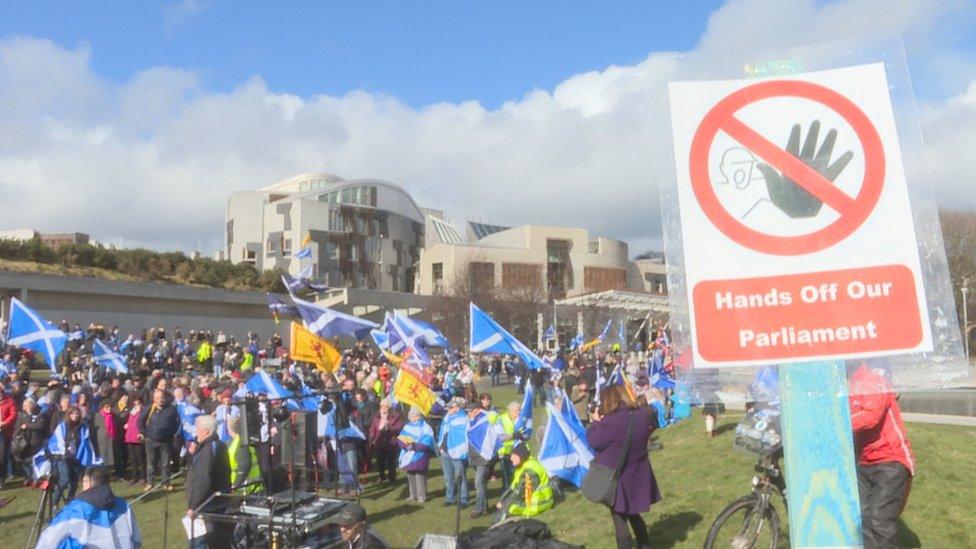'Power grab' protest held at Scottish Parliament
- Published

Protestors linked arms around the Scottish Parliament
Hundreds of people have gathered at Holyrood to stage a protest against a Westminster "power grab" on the Scottish Parliament.
The event was organised by the Hands Off Our Parliament group, which said it aimed to defy Westminster attempts to "undermine devolution".
The group asked people link hands around Holyrood in a symbolic gesture of protection.
And it formed a schiltron of 101 Saltire shields outside the building.
One protester told 大象传媒 Scotland that she had marched alongside 30,000 people in 1992 to call for the creation of a Scottish Parliament.
She added: "I am here again because I can't bear the thought of the powers we have being lost.
"I think the Continuity Bill going through gave me hope. But at the end of the day, if Theresa May decides she doesn't want to go with it there's nothing we can do against it."
Agnes Thomson, one of the organisers of the event, said she had originally hoped for 75 people to attend, and was delighted to see so many more turn up.
Ms Thomson told 大象传媒 Scotland that she and three others had decided to stage the protest after hearing that "they're going to take our powers and try and close parliament down".
She added: "So we decided that everybody in Scotland - it didn't matter what political party, colour, race or creed - we need to protect the voice of Scotland through the Scottish Parliament."
Agnes Thomson said the turnout had far exceeded her expectations
The Scottish and UK governments are locked in a deadlock over what happens to powers in devolved areas after Brexit.
UK ministers have put forward changes that would see the "vast majority" of those 158 EU powers returning directly from Brussels to Edinburgh, Cardiff and Belfast, which it says would dramatically increase - rather than reduce - the powers of the Scottish Parliament.
But it has named 24 devolved policy areas where it wants to retain power temporarily in the wake of Britain's exit from the bloc, including in areas such as agriculture, fisheries, food labelling and public procurement.
The Scottish and Welsh governments say they are not opposed in principle to UK-wide frameworks being established, but rejected the idea of letting UK ministers set them up without approval from Holyrood and Cardiff Bay.
A series of talks aimed at resolving the dispute have so far failed to reach agreement - although First Minister Nicola Sturgeon recently said she believed a deal could be done after meeting the prime minister at Downing Street.
The Scottish government's Continuity Bill was passed by Holyrood on Wednesday.
It says the bill would ensure would ensure that Scottish law could continue to operate effectively after Brexit should an agreement not be reached with the UK government.